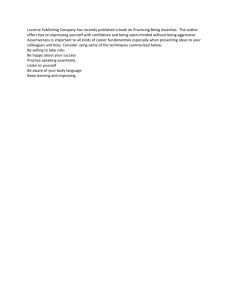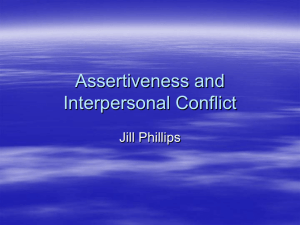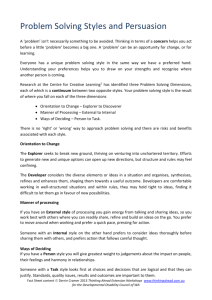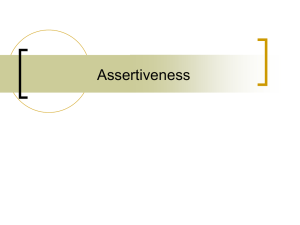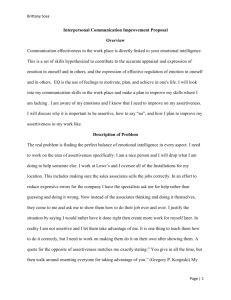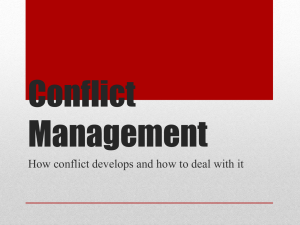1 What Is Assertiveness? Elizabeth Scott, M.S. Assertiveness is the
advertisement
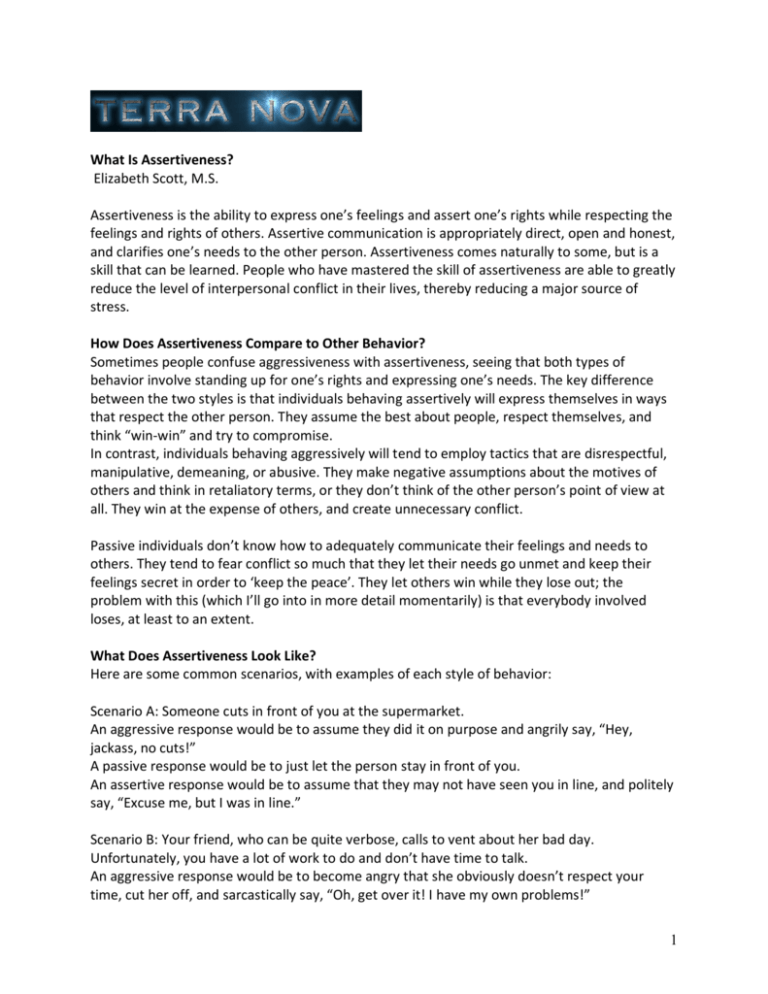
What Is Assertiveness? Elizabeth Scott, M.S. Assertiveness is the ability to express one’s feelings and assert one’s rights while respecting the feelings and rights of others. Assertive communication is appropriately direct, open and honest, and clarifies one’s needs to the other person. Assertiveness comes naturally to some, but is a skill that can be learned. People who have mastered the skill of assertiveness are able to greatly reduce the level of interpersonal conflict in their lives, thereby reducing a major source of stress. How Does Assertiveness Compare to Other Behavior? Sometimes people confuse aggressiveness with assertiveness, seeing that both types of behavior involve standing up for one’s rights and expressing one’s needs. The key difference between the two styles is that individuals behaving assertively will express themselves in ways that respect the other person. They assume the best about people, respect themselves, and think “win-win” and try to compromise. In contrast, individuals behaving aggressively will tend to employ tactics that are disrespectful, manipulative, demeaning, or abusive. They make negative assumptions about the motives of others and think in retaliatory terms, or they don’t think of the other person’s point of view at all. They win at the expense of others, and create unnecessary conflict. Passive individuals don’t know how to adequately communicate their feelings and needs to others. They tend to fear conflict so much that they let their needs go unmet and keep their feelings secret in order to ‘keep the peace’. They let others win while they lose out; the problem with this (which I’ll go into in more detail momentarily) is that everybody involved loses, at least to an extent. What Does Assertiveness Look Like? Here are some common scenarios, with examples of each style of behavior: Scenario A: Someone cuts in front of you at the supermarket. An aggressive response would be to assume they did it on purpose and angrily say, “Hey, jackass, no cuts!” A passive response would be to just let the person stay in front of you. An assertive response would be to assume that they may not have seen you in line, and politely say, “Excuse me, but I was in line.” Scenario B: Your friend, who can be quite verbose, calls to vent about her bad day. Unfortunately, you have a lot of work to do and don’t have time to talk. An aggressive response would be to become angry that she obviously doesn’t respect your time, cut her off, and sarcastically say, “Oh, get over it! I have my own problems!” 1 A passive response would be to let her talk for as long as she needs, and figure that your deadline can suffer; she needs your help. An assertive response would be to listen for a minute or two, then compassionately say, “Wow, it sounds like you’re having a tough day! I’d love to talk to you about it, but I don’t have the time right now. Can we talk later tonight?” Get the idea? What Are the Benefits of Assertiveness? Assertiveness affects many areas of life. Assertive people tend to have fewer conflicts in their dealings with others, which translates into much less stress in their lives. They get their needs met (which also means less stressing over unmet needs), and help others get their needs met, too. Having stronger, more supportive relationships virtually guarantees that, in a bind, they have people they can count on, which also helps with stress management, and even leads to a healthier body. Contrasting with this, aggressiveness tends to alienate others and create unnecessary stress. Those on the receiving end of aggressive behavior tend to feel attacked and often avoid the aggressive individual, understandably. Over time, people who behave aggressively tend to have a string of failed relationships and little social support, and they don’t always understand that this is related to their own behavior. Ironically, they often feel like victims, too. Passive people aim to avoid conflict by avoiding communication about their needs and feelings, but this behavior damages relationships in the long run. They may feel like victims, but continue to avoid confrontation, becoming increasingly angry until, when they finally do say something, it comes out aggressively. The other party doesn’t even know there’s a problem until the formerly passive individual virtually explodes! This leads to hard feelings, weaker relationships, and more passivity. How Does One Become More Assertive? The first step in becoming more assertive is to take an honest look at yourself and your responses, to see where you currently stand. The answers to the following questions will help clue you in: Do you have difficulty accepting constructive criticism? Do you find yourself saying ‘yes’ to requests that you should really say ‘no’ to, just to avoid disappointing people? Do you have trouble voicing a difference of opinion with others? Do people tend to feel alienated by your communication style when you do disagree with them? Do you feel attacked when someone has an opinion different from your own? If you answered yes to several of these, you may benefit from learning assertiveness skills. Knowing where you stand on the assertiveness spectrum, and knowing where you want to be, you can read more on assertiveness training, develop a win-win mentality, and begin becoming more assertive today! 2 Assertive communication can strengthen your relationships, reducing stress from conflict and providing you with social support when facing difficult times. A polite but assertive ‘no’ to excessive requests from others will enable you to avoid overloading your schedule and promote balance in your life. Assertive communication can also help you handle difficult family, friends and co-workers more easily, reducing drama and stress. Difficulty: Average Time Required: Very Little Extra Time Here's How: When approaching someone about behavior you’d like to see changed, stick to factual descriptions of what they’ve done that’s upset you, rather than labels or judgments. Here’s an example: Situation: Your friend, who habitually arrives late for your plans, has shown up twenty minutes late for a lunch date. Inappropriate: "You’re so rude! You’re always late." Assertive Communication: "We were supposed to meet at 11:30, but now it’s 11:50." The same should be done if describing the effects of their behavior. Don’t exaggerate, label or judge; just describe: Inappropriate: “Now lunch is ruined.” Assertive Communication: “Now I have less time to spend lunching because I still need to be back to work by 1pm.” Use “I Messages”. Simply put, if you start a sentence off with “You”, it comes off as more of a judgment or attack, and puts people on the defensive. If you start with “I”, the focus is more on how you are feeling and how you are affected by their behavior. Also, it shows more ownership of your reactions, and less blame. For example: ‘You Message’: “You need to stop that!” ‘I Message’: “I’d like it if you’d stop that.” Here’s a great formula that puts it all together: “When you [their behavior], I feel [your feelings].” When used with factual statements, rather than judgments or labels, this formula provides a direct, non-attacking, more responsible way of letting people know how their behavior affects you. For example: “When you yell, I feel attacked.” A more advanced variation of this formula includes the results of their behavior (again, put into factual terms), and looks like this: “When you [their behavior], then [results of their behavior], and I feel [how you feel].” Here are some examples: “When you arrive late, I have to wait, and I feel frustrated.” “When you tell the kids they can do something that I’ve already forbidden, some of my authority as a parent is taken away, and I feel undermined.” Tips: 3 Make sure your body reflects confidence: stand up straight, look people in the eye, and relax. Use a firm, but pleasant, tone. Don’t assume you know what the other person’s motives are, especially if you think they’re negative. When in a discussion, don’t forget to listen and ask questions! It’s important to understand the other person’s point of view as well. Try to think win-win: see if you can find a compromise or a way for you both get your needs met. What Is Assertiveness? QUESTIONS Define assertiveness in your own words. What is the value of assertiveness? Are assertive people born that way or do they learn how to be assertive? How Does Assertiveness Compare to Other Behavior? What is the main difference between assertiveness and aggressiveness? When passive people decide to remain passive when they should be assertive, what is the outcome? What Does Assertiveness Look Like? How would you have responded in Scenario A if someone cut in front of you at the supermarket? How would you have responded in Scenario B if your verbose friend called you? Describe an incident or a scenario where you knew you had a choice to be assertive or passive. Which one did you choose, and why? How would you do things differently next time? 4 What Are the Benefits of Assertiveness? Name the top three benefits of assertiveness. Why did you choose those? Can you name other negative effects of aggressiveness than the ones mentioned in the article? Describe an incident when you remained passive. How would you respond if that happened again? How Does One Become More Assertive? The first step in becoming more assertive is to take an honest look at yourself and your responses, to see where you currently stand. How would you answer the following questions? What changes could you make to enable yourself to accept constructive criticism? What changes could you make to enable yourself to say ‘no’ to people without the fear of disappointing them? When you have a difference of opinion with others, how could you best voice it? Do people tend to feel alienated by your communication style when you do disagree with them? What could you do to make them feel more accepted? Do you feel attacked when someone has an opinion different from your own? Why or why not? Terra Nova Coaching Services www.terranovalifecoaching.com timlifecoach@gmail.com 5
